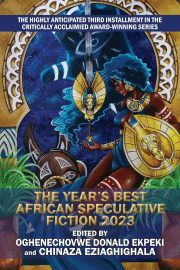Making It Different – Pushing Genre Boundaries in Fantasy
by Martin Jenkins
 One of the pleasures of genre is that it lets us identify a type of writing that we know we like. We’d feel short-changed if a crime novel didn’t feature a crime, after all, or if a romance didn’t put the travails of a relationship front and center. What we don’t want to see, however, is a mere repetition of genre tropes and clichés – it’s what is fresh and different in a work of fiction that keeps us turning the page while still being identifiably a genre work. Thus not every crime novel features a body in the library of a country house with a shifty butler in attendance — and thank goodness!
One of the pleasures of genre is that it lets us identify a type of writing that we know we like. We’d feel short-changed if a crime novel didn’t feature a crime, after all, or if a romance didn’t put the travails of a relationship front and center. What we don’t want to see, however, is a mere repetition of genre tropes and clichés – it’s what is fresh and different in a work of fiction that keeps us turning the page while still being identifiably a genre work. Thus not every crime novel features a body in the library of a country house with a shifty butler in attendance — and thank goodness!
This ‘keeping it fresh’ approach applies to fantasy as much as to any genre – even more so, in fact, for the strength of fantasy surely lies in an ability to paint vividly new and other worlds. So it is a disappointment when fantasy tends to the formulaic, deploying stock characters and plot devices that can easily prompt a weary sigh of recognition rather than the thrill of encountering something new.
Even the burgeoning array of sub-genres – the 57 varieties of high and low, urban, mythopoeic and all the rest – can all too easily settle into a default template. Consider how steampunk, for example, quickly became a handful of well-worn signifiers: all airships and goggles, crinolines and cogs.
This is not to say that all current fantasy writing is merely a late echo, doomed to repeat the form set by the early masters (and they do tend to be blokes) such as Lord Dunsany, J.R.R. Tolkien, and C.S. Lewis. On the contrary, contemporary fantasy is as vibrant and exciting as it ever has been; it is just a matter of sorting the wheat from the chaff.
As writers, then, how can we avoid the clichéd and routine and extend the boundaries of the type of writing we love? How can we walk the difficult tightrope between the implicit rules of the genre – the things that make fantasy fantasy – and introducing your reader to a new and wonderful world? At its most challenging, fantasy fiction not only plays with its own genre conventions but can raise and probe questions of identity, sexuality, gender, and beliefs and values in religion and politics; and even raise questions about the ultimate nature of reality. What follows are a few ways we can think about pushing the boundaries of fantasy.
Have we seen this before?
Firstly, consider the elements of your fantasy world: are the characters, background and plot truly alive or do they seem hackneyed? A wizard, somewhat irascible but basically good, kicking up dust in his robes and wielding a staff may turn out to be a rich and complex character… but is it possible that your mage is nothing more than a lightly disguised Gandalf? Are your party of plucky, underdog adventurers pitted against some Ultimate Evil tired tropes or will they lead us somewhere unexpected and fresh? Be honest with yourself and also canvass the opinion of fellow readers and writers. An honest appraisal is invaluable for a work in progress: if someone whose view you trust says that your work reminds them of Middle Earth, Narnia, Westeros or wherever…they are probably right. The clichés of fantasy fiction are many: elves and orcs, prophecies and hidden kings, encounters in inns, and warrior women in chainmail bikinis… and dragons, always dragons! None of these in themselves are necessarily bad things, but they can feel tired if used unthinkingly.
Know your worldview
The above are the elements, the nuts and bolts of your world and work. But beyond the details, there is the larger question of your worldview as a whole. The default conception of a fantasy world owes much to The Lord of the Rings: I say this is not to take anything from that great work but to raise the question of those who followed and used it as an off-the-peg world setting. This includes pitting of clear-cut Good against an obvious Evil, a pastoral setting and high adventure that draws on European history and mythology. Many fantasy novels assume a vaguely feudal medievalism. The mythic tone of such works is drawn from Celtic, Norse or Christian legend and lore – often indiscriminately and rather incoherently mixed.
The question that needs to be asked is: does the broad worldview of your work form a coherent whole? Do the individual elements of your story fit seamlessly within the context of your world? For Tolkien, for example, a strongly dualistic vision of Good and Evil makes sense: his view of the ethos of the European mythic imagination that he draws on is reinforced by his own Christian convictions. In a grittier world without the metaphysical scaffolding of Middle Earth, however, such absolutism could seem out of place – moral ambiguity and shades of grey would be more appropriate.
Similarly, a vague feudalism is only one of a plethora of possible social formation and each type of society will have its own distinct complexion and balance. Think through the reasons why each part of your world is the way it is. A people blessed with rich resources will tend to be more peaceful and have a strong legal code, as compared with a land of scarcity where brigandage and a desperate fight for survival may be the norm; a society that values individuality as a supreme virtue will have quite different mores from one which prizes collective action, and so on.
Magic and religion
Magic is a staple of fantasy fiction. In your world how would magic work and how would it shape wider society? Powers based on attunement and sympathy with nature would be very different from dark sorceries based on the summoning of demons, not just in terms of magical style but, more broadly, in how they would be perceived and dealt with by the general populace.
The same goes for religion. Monotheistic, polytheistic or pantheistic religions will both influence and be influenced by the society around them. A shamanistic religion, for example, is part and parcel of particular types of culture, nomadic and tribal, and would not fit well as an underpinning of a feudal society.
Dignifying diversity
Social behavior does not arise in a vacuum but grows out of an individual’s cultural matrix. We are, happily, more aware now of human diversity: attitudes to gender roles, sexuality, race, and non-neurotypical mental states are much broader than they were. Drawing on a wide view of history and anthropology we can see that those recently, and pejoratively labeled “mad,” for example, would in other times and societies have been seen as “holy fools” or in special contact with the gods.
The status of women and attitudes towards same-sex relationships have also varied widely in different cultures. In writing fantasy, we should cast our net wide in trying to envision our worlds. That is not to say that we should simply give our work a few tokenistic twists; much less is it to promote some sort of “agenda”; it is simply an openness to the sensuous richness and the vast compass of forms of human life.
Beyond the human
Beyond the human, we can also look to the non-human persons that form part of the stock-in-trade of fantasy. Dwarves, elves, orcs, and dragons are firm fixtures here, but again there is scope for the development of weird and wild non-human societies. We can also draw on our current awareness of the “ecological” – the fabric of life considered as a whole. Different and new ways of envisioning people’s relationship to Nature are ripe for exploration in fantasy fiction.
Three tips for stronger world-building
How, then, can we encourage greater breadth and depth of insight? The authorial process of worldbuilding can feel overwhelming at the best of times. Here are three tips.
First, within the fantasy genre itself, read outside your comfort zone. Seek out authors or approaches that you think you may find challenging or even uncomfortable – you may be pleasantly surprised and you will avoid a narrow niche of your favored sub-genre.
Second, don’t just read fantasy! Consideration of the richness of world history, its myths and legends and the manifold ways that peoples in the past have lived their lives forms a rich loam for the germination of ideas. Don’t merely transpose from whatever you read but use it to spark the alchemical process of creation.
Last, don’t just read! Outside your door is a whole wide world that offers a wealth of material. From your friends and neighbors to Mandaeans in the Middle East, Australian aborigines and kids scraping a living in Brazilian favelas, there is an inspiration to spark enough ideas for a million fantasy novels…
•••
Martin Jenkins is a freelance writer, researcher, and editor. Publications include the experimental novel A New Science of Navigation and a contribution to the Soul Bay Press short story anthology.


